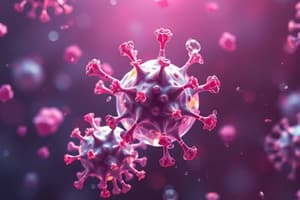Podcast
Questions and Answers
Which of the following is NOT a type of molecule used to treat or prevent disease?
Which of the following is NOT a type of molecule used to treat or prevent disease?
- Synthetic molecule
- Radioactive molecule (correct)
- Natural molecule
- Semisynthetic molecule
What is the primary purpose of a molecule used to treat or prevent disease?
What is the primary purpose of a molecule used to treat or prevent disease?
- To develop a vaccine for a specific disease
- To alleviate symptoms of bacterial meningitis
- To diagnose viral meningitis
- To treat or prevent disease (correct)
What is the primary difference between a natural molecule and a semisynthetic molecule?
What is the primary difference between a natural molecule and a semisynthetic molecule?
- Method of production (correct)
- Source of origin
- Effectiveness in treating disease
- Chemical structure
Which of the following diseases is most likely to be treated with a synthetic molecule?
Which of the following diseases is most likely to be treated with a synthetic molecule?
What is the primary goal of using a molecule to treat or prevent disease?
What is the primary goal of using a molecule to treat or prevent disease?
What may indicate the need for quantitative susceptibility testing in patients with meningitis?
What may indicate the need for quantitative susceptibility testing in patients with meningitis?
Which type of meningitis is more likely to require quantitative susceptibility testing?
Which type of meningitis is more likely to require quantitative susceptibility testing?
What is the primary purpose of quantitative susceptibility testing in meningitis treatment?
What is the primary purpose of quantitative susceptibility testing in meningitis treatment?
Which of the following is a symptom that may indicate the need for quantitative susceptibility testing in meningitis patients?
Which of the following is a symptom that may indicate the need for quantitative susceptibility testing in meningitis patients?
What is the consequence of not performing quantitative susceptibility testing in meningitis patients who fail to respond to antimicrobial therapy?
What is the consequence of not performing quantitative susceptibility testing in meningitis patients who fail to respond to antimicrobial therapy?
What is the primary goal of laboratory strategies for antimicrobial sensitivity testing?
What is the primary goal of laboratory strategies for antimicrobial sensitivity testing?
Why is it challenging to fulfill the responsibility of maximizing positive results in antimicrobial sensitivity testing?
Why is it challenging to fulfill the responsibility of maximizing positive results in antimicrobial sensitivity testing?
What is the assumption underlying the implementation of laboratory strategies for antimicrobial sensitivity testing?
What is the assumption underlying the implementation of laboratory strategies for antimicrobial sensitivity testing?
What is the primary objective of antimicrobial sensitivity testing in the context of infectious diseases?
What is the primary objective of antimicrobial sensitivity testing in the context of infectious diseases?
What is the consequence of failing to implement effective laboratory strategies for antimicrobial sensitivity testing?
What is the consequence of failing to implement effective laboratory strategies for antimicrobial sensitivity testing?
What is the ultimate goal of antimicrobial sensitivity testing in the context of infectious diseases?
What is the ultimate goal of antimicrobial sensitivity testing in the context of infectious diseases?
Flashcards are hidden until you start studying
Study Notes
Quantitative Susceptibility Testing
- Necessary for patients who fail to respond to antimicrobial therapy or relapse during therapy
- Targets accuracy and communication as goals
Importance of Susceptibility Testing
- Crucial for effective management of infectious diseases
- Ensures high-quality results for informed antimicrobial therapy
- Overcoming challenges of increasing bacterial resistance and limited laboratory resources
Definition of Antimicrobial Agents
- Clinically significant organisms
- Natural, semisynthetic, or synthetic molecules used to treat or prevent disease
Studying That Suits You
Use AI to generate personalized quizzes and flashcards to suit your learning preferences.




